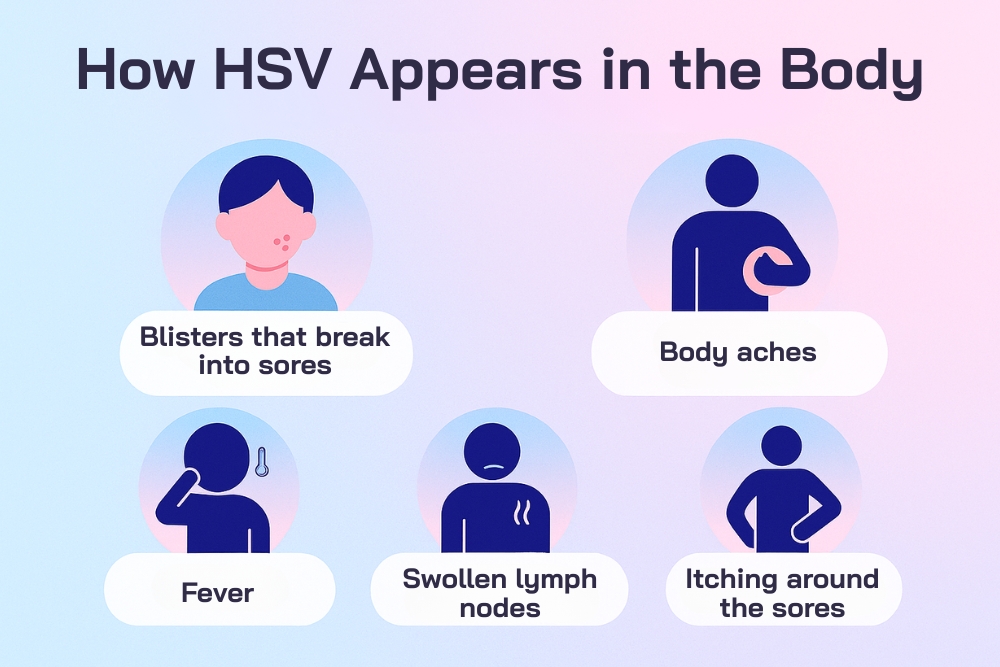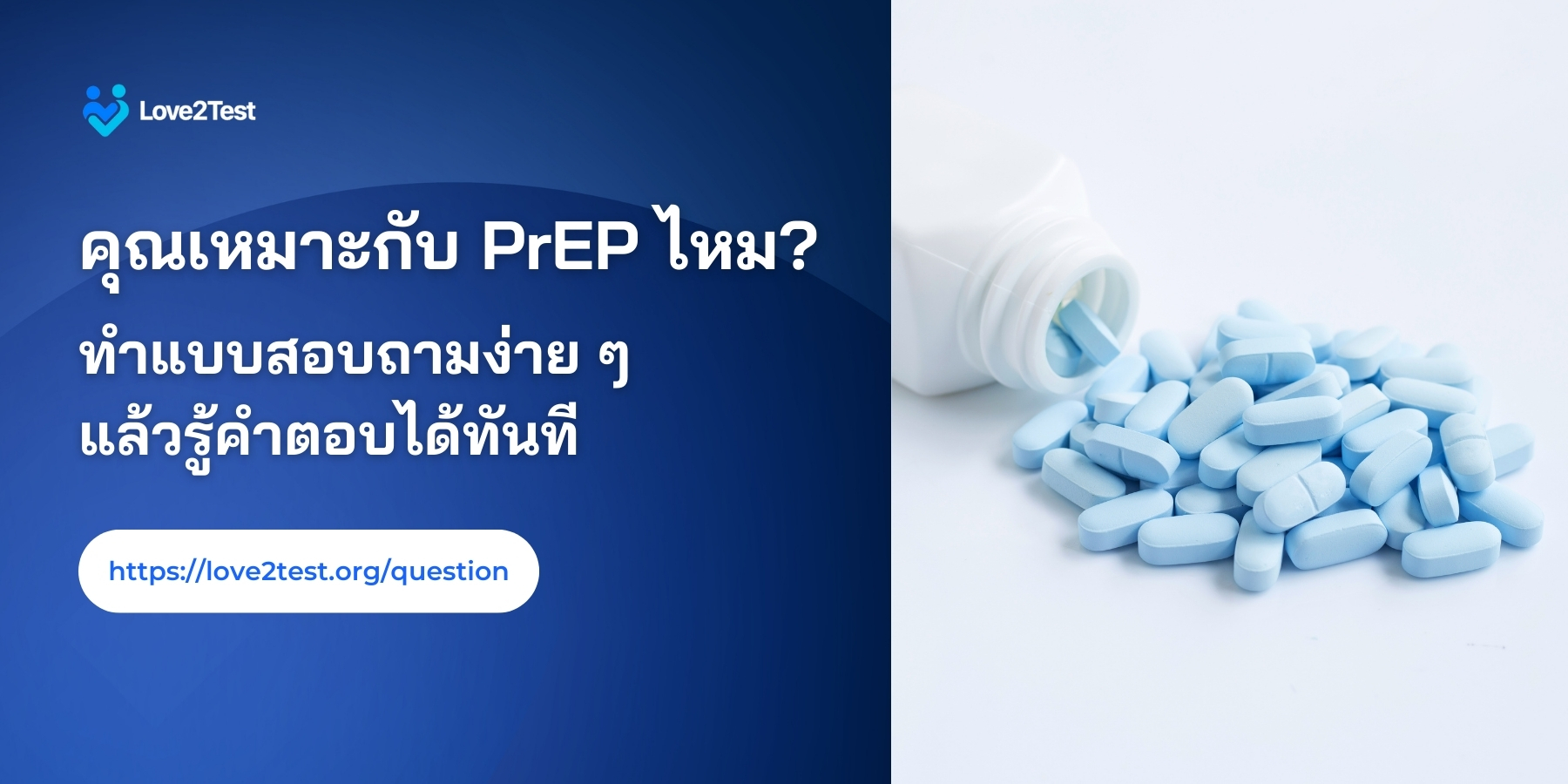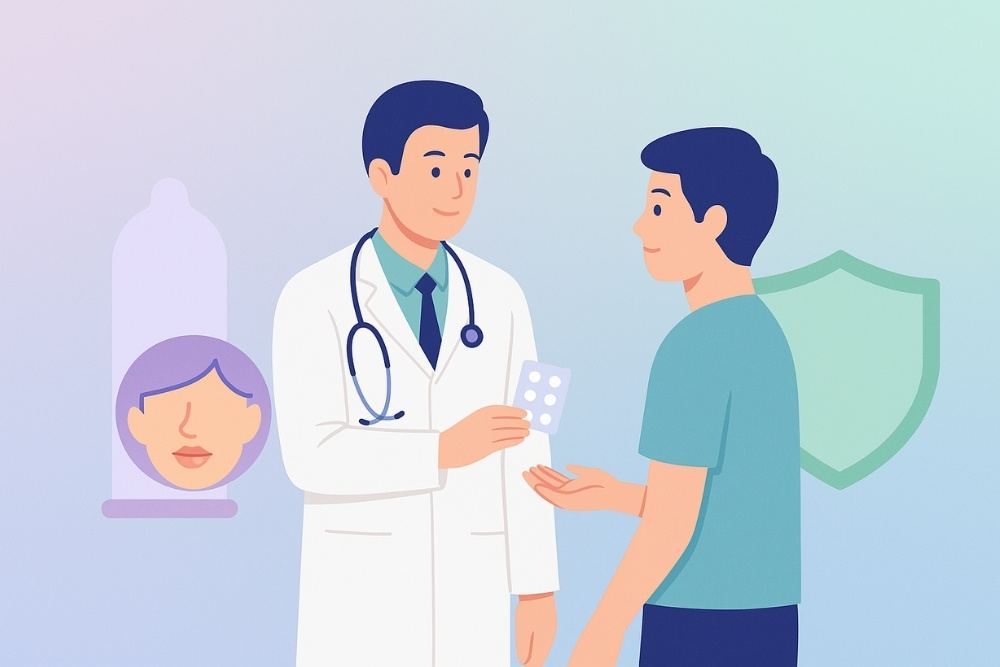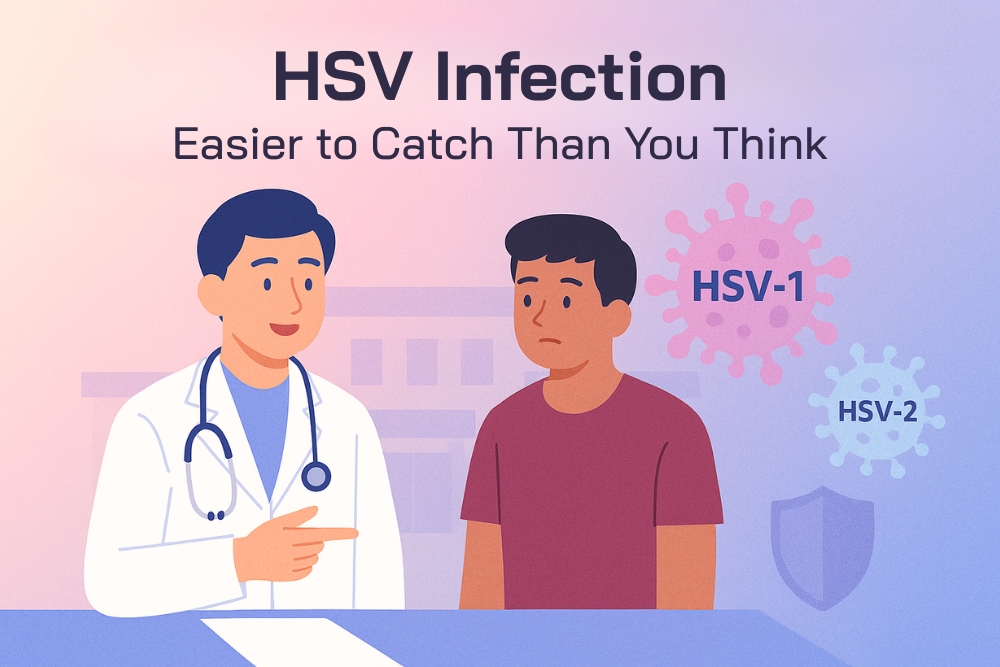Many people think of herpes as nothing more than a small blister on the lips or around the genitals. In reality, herpes is a much more common and contagious infection than most realize. It can spread easily through direct skin-to-skin contact, kissing, or unprotected sexual activity. What makes HSV infection particularly complex is that many carriers show little to no symptoms, yet they can still transmit the virus to others. This article explores how HSV infection occurs, why it spreads so easily, the signs you should watch out for, and the most effective prevention and treatment methods. By understanding the basics, you can reduce your risk, protect others, and live with confidence.
List of Contents
- Types of HSV Infection
- How HSV Appears in the Body
- Causes and Risk Factors
- Diagnosis
- Complications of HSV Infection
- Complications of HSV Infection in Special Groups
- Children
- Treatment of HSV Infection
- Medications for HSV Infection
- Self-Care
- Prevention of HSV Infection
- Where to Get Treatment
- Q&A About HSV
Types of HSV Infection
Herpes is caused by the Herpes Simplex Virus (HSV), which comes in two main types. Each type is associated with different areas of infection, but both can spread through close contact.
🦠 Oral Herpes (HSV-1)

HSV-1, often called “oral herpes,” is the most common type. It usually causes cold sores or small blisters around the lips, mouth, and skin above the waist, such as the face, neck, or even the eyes. Transmission happens through close contact like kissing, or sharing utensils, cups, or personal items. Importantly, HSV-1 can spread even when no visible symptoms are present.
🦠 Genital Herpes (HSV-2)
HSV-2, or “genital herpes,” affects the genital area, around the anus, or the lower body. This type is one of the most common sexually transmitted infections (STIs). It spreads primarily through vaginal, anal, or oral sex. Symptoms may include itching, burning, or pain before blisters and sores appear. Recurrence is also common with HSV-2, meaning outbreaks can return after the initial infection.
While HSV-1 and HSV-2 typically affect different parts of the body, both viruses can be transmitted between oral and genital areas. For example, oral sex with someone who has HSV-1 can result in genital infection. This is why understanding the mechanisms of transmission is crucial for proper prevention.
How HSV Appears in the Body

Symptoms of HSV infection vary depending on whether it’s a first-time infection or a recurrence. Some people show no signs at all, while others experience painful outbreaks.

- Primary infection: The first episode can cause painful blisters that break into shallow ulcers, accompanied by burning sensations, fever, body aches, or swollen lymph nodes.
- Recurrent infection: After the initial outbreak heals, the virus remains dormant in nerve cells. Certain triggers—like stress, fatigue, or illness—can reactivate the virus, causing new blisters. Recurring outbreaks are usually milder, with fewer blisters and less severe symptoms.
Causes and Risk Factors
HSV spreads through direct contact with infected areas of the skin or mucous membranes. It can enter the body through:
- Skin-to-skin contact with blisters or sores
- Kissing or oral contact with infected areas
- Sexual intercourse without protection
- Contact with contaminated surfaces like utensils, razors, or towels
- Touching sores and then other parts of the body (such as eyes or open cuts)
Because the virus can spread even when no visible symptoms are present, it is considered highly contagious.
Diagnosis
Doctors usually diagnose HSV based on patient history and a physical examination of the blisters or sores. In uncertain cases, laboratory tests may be required, such as:
- Microscopic examination of fluid from blisters
- Blood tests for HSV antibodies
- Viral culture or PCR testing
A confirmed diagnosis helps doctors prescribe the right antiviral treatment and provide counseling about transmission and prevention.
Complications of HSV Infection
Most complications from HSV infection occur when blisters and sores are not properly cleaned or cared for, which makes them prone to bacterial infection and inflammation. Possible complications of HSV include:
- Secondary bacterial infection: Fluid-filled blisters may become open sores that worsen into ulcers or pus-filled lesions due to repeated bacterial infection.
- Eye infection: Recurrent HSV can spread to the eyes, leading to corneal inflammation and potentially impairing vision.
- Widespread infection in skin conditions: Individuals with pre-existing skin diseases (such as eczema) are at higher risk of HSV spreading extensively across the body if oral herpes develops.
- Cervical cancer risk: Women with genital HSV infection face an increased risk of developing cervical cancer.
- Higher susceptibility to other STIs: Genital HSV infection can increase the chance of contracting other sexually transmitted infections.
- Neurological involvement: In some cases, HSV may affect organs beyond the mouth, skin, and genitals—such as the brain, spinal cord, or nervous system.
- Rectal inflammation: HSV can cause proctitis, or inflammation of the rectal lining.
- Scarring: If untreated, HSV sores may heal with permanent scarring.
Complications of HSV Infection in Special Groups
Pregnant Women
HSV infection during pregnancy poses significant risks for both the mother and the baby.
- If a mother contracts HSV in the third trimester, the baby may experience restricted growth in the womb or be born prematurely.
- If the mother has active herpes lesions in the cervix or vagina during labor, the virus can be transmitted to the baby during delivery, leading to neonatal herpes, which can be severe and life-threatening.
- Congenital herpes (when a baby is infected before or during birth) can cause serious complications such as low birth weight, microcephaly (abnormally small head), small eyes, pneumonia, enlarged liver, cataracts, inflammation of the retina and choroid, as well as widespread skin rashes or lesions on the fingers.
Children
In children, HSV can trigger severe complications:
-
Eczema herpeticum, a widespread herpes infection in children with atopic dermatitis (eczema), which may become life-threatening if not treated promptly.
Newborns
Newborns are particularly vulnerable to HSV complications:
-
Disseminated HSV infection, where the virus spreads throughout the body, affecting vital organs such as the lungs, brain, digestive system, liver, kidneys, and bone marrow. This condition can be fatal without urgent medical care.
Immunocompromised Individuals
People with weakened immune systems (such as those with HIV, undergoing chemotherapy, or on immunosuppressive medications) are at higher risk of severe HSV complications:
- Esophagitis, or inflammation of the esophagus, leading to painful swallowing and nutritional issues.
- Hepatitis, or inflammation of the liver caused by HSV, which can result in serious liver damage if untreated.
Treatment of HSV Infection
Herpes cannot be completely cured, but its symptoms can be managed and relieved. Doctors may prescribe antiviral medications or pain relievers to shorten the duration of outbreaks and reduce their severity. Antiviral drugs work by inhibiting the replication of the herpes virus, helping lesions heal faster and lowering the risk of transmitting the virus to others. In addition, pain relievers may be prescribed to ease pain and burning sensations around the affected area.
Medications for HSV Infection
Antiviral drugs
Available in both oral and topical forms, antivirals help control HSV infection, promote faster healing of sores, and reduce recurrence. These medications must be prescribed by a doctor and include:
- Zovirax (acyclovir)
- Famvir (famciclovir)
- Abreva (docosanol)
- Valtrex (valacyclovir)
Pain relievers
Pain relief can be achieved with oral medications or topical gels and ointments. Many of these can be purchased over the counter at pharmacies.
- Oral medications: Aspirin, Tylenol (acetaminophen), Motrin (ibuprofen), Advil
- Topical options: Benzoyl alcohol, Benzocaine, Dibucaine, Lidocaine
Self-Care for HSV Infection
In addition to medical treatment, self-care plays an important role in reducing the severity of symptoms and preventing further outbreaks. Helpful strategies include:
- Drinking plenty of water
- Getting adequate rest
- Avoiding direct contact with sores
- Eating clean, nutritious food
- Avoiding hot, spicy, or salty foods if oral sores are present
Prevention of HSV Infection
While herpes cannot be permanently cured, prevention and careful management are essential to avoid reinfection and to reduce the spread of the virus to others. Recommended preventive measures include:
- Avoiding triggers that may cause recurrent outbreaks.
- Consulting a doctor if outbreaks occur more than six times per year or are unusually severe.
- For uninfected individuals, avoiding direct contact with the bodily fluids of infected persons.
- If genital herpes lesions are present, avoiding sexual activity from the onset of symptoms until sores are completely healed.
- Using condoms consistently during sexual intercourse, especially when no visible symptoms are present, as the virus can still spread.
- Being aware that the contagious period extends from the onset of symptoms until lesions have fully crusted over.
- Avoiding sharing personal items such as utensils, cosmetics, glasses, towels, or clothing, as these may facilitate virus transmission.
- Pregnant women with HSV infection should consult a doctor immediately to prevent complications that may affect the unborn child.
Where to Get Treatment for HSV Infection
In Bangkok
- Treatment for herpes is available at both public and private hospitals. You can also visit private clinics or conveniently book an appointment online through Love2test.
In Other Provinces
- Herpes treatment is available at public and private hospitals across the country, often free of charge under the national healthcare system.
Q&A About HSV Infection

1. If I have herpes and the sores have already dried, can I still transmit the virus to someone else?
- Once the sores have completely dried and healed, the risk of transmission is significantly reduced. However, it is still recommended to avoid direct contact with the affected area during this period.
2. I frequently experience herpes outbreaks with burning sensations. How should I manage this?
- Recurrent outbreaks may indicate a weakened immune system. It is advised to reduce triggering factors such as stress and excessive sun exposure. Maintaining a healthy lifestyle through regular exercise, adequate rest, and stress management is essential. Consulting a doctor is also recommended to plan appropriate treatment and long-term management.
Related Articles
Conclusion
Herpes is a common contagious infection, but it can be prevented with the right precautions. Avoiding direct contact with active sores, not sharing personal items, and consistently using condoms during sexual activity are key preventive measures. Most importantly, if you are at risk or suspect an infection, seek medical advice for proper testing and diagnosis. Timely and appropriate treatment not only relieves symptoms but also prevents complications, helping you live more confidently and safely.
Reference:
รู้ทันโรคเริม (Herpes simplex) สาเหตุ อาการ พร้อมวิธีรักษา
- https://samitivejchinatown.com/th/article/sexual-health/herpes-simplex
โรคเริมที่ผิวหนัง Vs. โรคเริมที่อวัยวะเพศ แตกต่างกันยังไง?
เริมมีสาเหตุการเกิดจากอะไร รักษาหายไหม?
- https://www.vimut.com/article/Herpes-Simplex-virus

